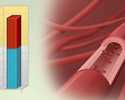Cholesterol - what to ask your doctor
Hyperlipidemia - what to ask your doctor; What to ask your doctor about cholesterol
Your body needs cholesterol to work properly. When you have extra cholesterol in your blood, it builds up inside the walls of your arteries (blood vessels), including the ones that go to your heart. This buildup is called plaque.
Plaque narrows your arteries and slows or stops the blood flow. This can cause a heart attack , stroke , or other serious heart disease.
Heart attack
Most heart attacks are caused by a blood clot that blocks one of the coronary arteries. The coronary arteries bring blood and oxygen to the heart. ...

Stroke
A stroke occurs when blood flow to a part of the brain stops. A stroke is sometimes called a "brain attack. " If blood flow is cut off for longer th...

Below are some questions you may want to ask your health care provider to help you take care of your cholesterol.
Questions
What is my cholesterol level? What should my cholesterol level be?
- What are HDL ("good") cholesterol and LDL ("bad") cholesterol?
- Does my cholesterol need to be better?
- How often should I have my cholesterol checked?
What medicines am I taking to treat high cholesterol?
- Do they have any side effects?
- What should I do if I miss a dose?
- Are there foods, other medicines, vitamins, or herbal supplements that may change how well my cholesterol medicines work?
What is a heart-healthy diet?
- What are low-fat foods?
- What types of fat are OK for me to eat?
- How can I read a food label to know how much fat there is?
- Is it ever OK to eat something that is not heart healthy?
- What are some ways to eat healthy when I go to a restaurant? Can I ever go to a fast-food restaurant again?
- Do I need to limit how much salt I use? Can I use other spices to make my food taste good?
- Is it OK to drink any alcohol?
What can I do to stop smoking?
Should I start an exercise program?
- Is it safe for me to exercise on my own?
- Where should I exercise, inside or outside?
- Which activities are better to start with?
- Are there activities or exercises that are not safe for me?
- Can I exercise most days?
- How long and how hard can I exercise?
- What symptoms may I need to watch out for?
References
Genest J, Libby P. Lipoprotein disorders and cardiovascular disease. In: Mann DL, Zipes DP, Libby P, Bonow RO, Braunwald E, eds. Braunwald's Heart Disease: A Textbook of Cardiovascular Medicine . 10th ed. Philadelphia, PA: Elsevier Saunders; 2015:chap 45.
Ridker PM, Libby P, Burning JE. Risk markers and the primary prevention of cardiovascular disease. In: Mann DL, Zipes DP, Libby P, Bonow RO, Braunwald E, eds. Braunwald's Heart Disease: A Textbook of Cardiovascular Medicine . 10th ed. Philadelphia, PA: Elsevier Saunders; 2015:chap 42.
Stone NJ, Robinson JG, Lichtenstein AH, Bairey Merz CN, Blum CB, Eckel RH, et al. 2013 ACC/AHA guideline on the treatment of blood cholesterol to reduce atherosclerotic cardiovascular risk in adults: a report of the American College of Cardiology/American Heart Association Task Force on Practice Guidelines. J Am Coll Cardiol . 2014;63(25 Pt B):2889-2934. PMID: 24239923 www.ncbi.nlm.nih.gov/pubmed/24239923 .
-
Hyperlipidemia - overview
Animation
-
Plaque buildup in arteries - illustration
A heart attack or stroke may occur when an area of plaque (atherosclerosis) ruptures and a clot forms over the location, blocking the flow of blood to the organ's tissues.
Plaque buildup in arteries
illustration
-
Hypercholesterolemia
(Alt. Medicine)
-
Atherosclerosis
(Alt. Medicine)
-
Myocardial infarction
(Alt. Medicine)
-
Red yeast rice
(Alt. Medicine)
Review Date: 8/2/2016
Reviewed By: Michael A. Chen, MD, PhD, Associate Professor of Medicine, Division of Cardiology, Harborview Medical Center, University of Washington Medical School, Seattle, WA. Also reviewed by David Zieve, MD, MHA, Isla Ogilvie, PhD, and the A.D.A.M. Editorial team.



